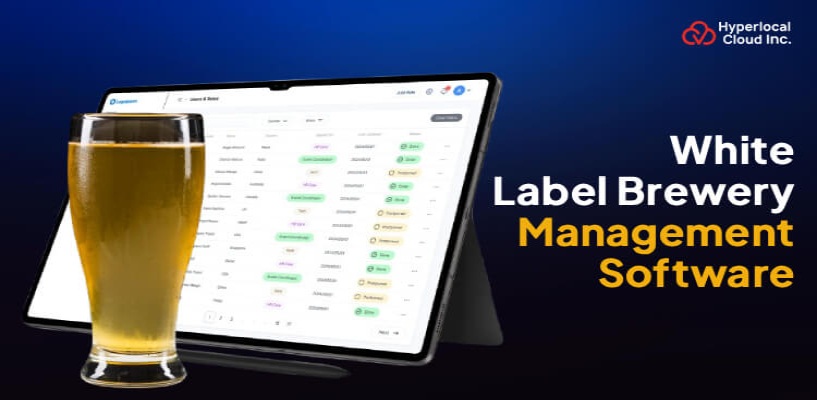White Label Brewery Management Software

The brewing industry has developed rapidly over the years. While the production of beer has always been a craft, the technology has arrived at a new dimension in the way of serving the breweries. The software has emerged as an essential tool that helps brewers to handle operations evenly, while adapting the processes for development to ensure stability and quality.
The brewery management software integrates different aspects by serving a brewery in a single, streamlined platform. For inventory management, production tracking, and quality control for customer relationships, sales, and accounting, this software is designed to manage the complex network of activities involved in running a successful liquor business. The importance of these systems increases as the breweries face demand for increasing competition, regulation compliance, and operational efficiency.
The market regularly increases, which is why these solutions are used to remain a more craft brewery. The increase in small-scale breweries and the change towards online sales and marketing have led to the development of brewery inventory management software solutions that suit these businesses.
What Do You Understand About Brewery Management Software?
The brewery inventory management software is a mobile application that is typically designed to automatically streamline the operation of a brewery. The software primarily works as a centralized platform in which production and distribution of the brewery are included. It enables brewers to focus more on quality and creativity, without any worry of manual errors or third-person involvement.
With the brewery inventory management system, it will become easier for businesses or startups to manage the workflow, monitor sales, and ensure follow rules and regulations. Thus, the software easily handles simple to complex inventory management with advanced features like accounting, logistics management, and CRM functions.
Take Your Brewery to the Next Level with Custom White Label Software!
Avail the Workflow of Brewery Management Software
The workflow of the brewery management software typically facilitates breweries in order to fulfill their business requirements. A complete breakdown of how the brewery inventory management software works is discussed below.
1. Ingredient Management
The software enables the breweries to monitor raw materials, including malt, hops, yeast, and other essential materials. The system can only inform when the stock levels are low and even automate the process of ordering from suppliers.
2. Recipe Management
Making and changing beer recipes is one of the most important features of the software that helps the brewers to track ingredient variations and make adjustments that fulfill the consumer demand. The system can also provide insight into the recipes that have been most successful in the market.
3. Production Tracking
When the material is ready, the production process begins. From mixing and cooking to fermentation and packaging, everything is systematically tracked by the software.
4. Inventory Management
The software keeps an overview of the finished item list, or in simple words, it is helpful for inventory management. It manages stock levels, calculates the amount of beer available for sale, and can even manage keg or bottle stock for delivery. This is important to reduce waste and avoid unnecessary stockouts.
5. Sales and Distribution
With the help of the software, it will be easy for brewers to track the customers’ orders, monitor sales, and manage the distribution of beer. Thus, the software generates accurate sales performance reports in order to identify top-selling beers and customize the distribution channels.
6. Accounting and Reporting
The software simplifies invoice management, enabling the view of cash flows, and generates financial reports. This is especially useful for small-sized breweries that may not have a dedicated accounting staff.
Positive Aspects of Investing in White Label Brewery Management Software
There are several effective benefits that businesses or startups will get after investing in the white label brewery management software. This approach comes with so many positive aspects; some of the most essential ones are mentioned below.
1. Cost-Effective
Developing software from the ground up can be a time-consuming and expensive process. White label solutions, at the same time, offer a clear system that can fit the specific requirements for the liquor oven for a fraction of the cost.
2. Faster Time to Market
Since white label solutions have already evolved, they save time compared to developing a customized solution. This allows the business to resume the benefits of the system immediately.
3. Customization Options
Although it has a completed solution, the white label provides the bravery management software for significant adaptation. This can be adapted to the unique needs and preferences of brewers, including branding, workflows, and specific functions.
4. Scalability
White label software is often designed for scalability. As the demand for brewery management software increases and the requirements develop, the software can be upgraded and expanded to support new features, functionality, or professional processes.
5. Proven Reliability
Since white label software is already tested, it provides a reliability level that may be lacking in customized solutions. This ensures that the software will have a stable and safe system for managing operations.
The Key Features of Brewery Management Software
A brewery management software comes with several emerging key features that positively facilitate the admin panel, user panel, and inventory management panel. Let’s have a look at the features mentioned below.
Admin Panel
1. User Management
Administrators can create, update, and remove user accounts. They provide roles and permissions so that each employee only uses the features they need.
2. Access Control
This feature allows administrators to define detailed permits. For example, a sales representative can see the customer’s order, but cannot change the production recipes. Access control protects sensitive data and protects the system.
3. System Configuration
Administrators installed software with corporate-specific information such as liquor oven name, tax rate, local currency, and units of measurement. This ensures all the data and the report reflect the actual operating conditions for the liquor oven.
4. Audit Logs
Each measure taken in the system is logged here. Administrators can see who changed a recipe, which updated the inventory, or who processed the orders. It provides responsibility and helps prevent errors or unauthorized changes.
5. Reports & Analytics Access
Administrators can generate extensive reports of all liquor ovens, including production efficiency, sales trends, and financial summaries. They use this insight to make high-level decisions.
6. Backup & Data Management
Admins can regularly schedule backup and administrative points, so that in the case of software failure or data corruption, the system can be restored quickly without losing significant information.
7. Integration Settings
Administrators establish connections with other commercial software, such as accounting software, a CRM System, or a payment gateway, which enables the smooth data exchange on the platforms.
8. Notifications Management
Administrators determine which system alerts are sent and who receives them, ensuring that the right people remain informed without additional fees.
User Panel (Brewers & Production Staff)
1. Recipe Management
Users can produce elaborate dishes by specifying materials, volume, and bridge steps. It ensures stability in taste and quality. Recipes can be edited to try new variants or seasonal parties.
2. Batch Tracking
Each group of beers is tracked from beginning to end. Brewers log production dates, fermentation progress, and packaging. This visibility helps to ensure that the deadline is met and quality standards are maintained.
3. Production Scheduling
Brewers are able to plan cycles and a financial timeline. The software shows the schedule so that the production work is well coordinated and the employees know what to do next.
4. Quality Control Logs
User entrance test results include pH level, gravitational reading, and microbial count. Keeping these items helps you quickly detect problems and maintain product quality.
5. Equipment Monitoring
Production employees log down the use and maintenance of the use tank, fermentation, and other machines. Planning preventive maintenance reduces shutdowns and increases life.
6. Alerts for Production Issues
If the temperature ups and downs are higher than the required limit, the system sends a notice to the production staff. This active notification prevents batch destruction.
7. Task Assignment
Brewers get their daily or shift tasks directly through the system, which helps them organize the work and ensures that no significant steps are missed.
8. Shift Logs
Users’ Documentation of notes and comments under the shifts, create a post for future references and quality audits.
Owner Panel
1. Real-Time Inventory Updates
Each time material is used or new stock comes, the system updates the storage level immediately. It prevents stock or overstay.
2. Supplier Management
This feature holds all supplier information in one place, including contact information, price agreements, and distribution programs. This simplifies reassessment and helps maintain good seller conditions.
3. Purchase Orders
Stock personnel can create and send a purchase order directly from the software. They can track the order of orders and expected distribution dates to plan production accordingly.
4. Stock Alerts
Automatic notifications inform employees when the shares of hops, painted, yeast, or packaging materials are low, which causes time to rebuild in time.
5. Batch Lot Tracking
Production for the traceability of stock products is associated with parties. If a batch has quality problems, the alcohol stove can trace back to the exact ingredients used.
6. Barcode Scanning
The use of barcode scanners reduces errors, scanning the element instead of manual data entry, taking stock, and performing inventory updates.
7. Stock Movement Logs
The software has a broad overview of all stock movements, including upcoming deliveries, internal transfers, and shipments, which helps prevent theft or loss.
8. Inventory Reports
Managers can generate reports to understand stock patterns, aging inventory, and sales rates, and help with better purchase decisions.
Get a Demo of Our White Label Brewery Management Software Today!
Transform the Brewery Management Software with AI Integration
Utilize advanced technologies like artificial intelligence for the efficient workflow of the brewery management software. A right integration of AI-powered technologies gives rise to so many advanced features and functionalities within the software. Just have a look:
1. Predictive Analytics
With the help of this feature, it will become easier to detect and analyze prior data in order to predict future trends and manage all the required operations. Thus, this helps plan production and sales more efficiently.
2. Automated Brewing Processes
With AI, the bridge process can be automated in real time, and the variables can be adjusted depending on the temperature, fermentation time, and other factors, such as continuous response. This can result in more consistent beers with minimal human intervention.
3. Demand Forecasting
AI can analyze sales data and forecasting requirements, and help breweries to meet their production program accordingly. This leads to little waste and better inventory management.
4. Quality Control
AI can monitor and analyze quality control parameters in real time, and notify brewers of potential problems before they become severe. It quickly detects high-quality beer and alcohol problems.
5. Operational Optimization
AI can continuously optimize alcohol operations by identifying and implementing improvements in areas such as work planning, energy consumption, and management of the supply chain.
Advanced Tech Stack Used to Build Brewery Inventory Management System
Several tech stacks are used by experienced custom software development companies to make the platform reliable, secure, and robust. The table mentioned below has a detailed overview of the same.
| Category | Technological Stack |
| Frontend Technologies | React.js or Angular, HTML5, CSS3, and Bootstrap |
| Backend Technologies | Node.js or Python, Express.js, Django, or Flask |
| Database Technologies | PostgreSQL, MySQL, MongoDB |
| Cloud Infrastructure | Amazon Web Services (AWS), Microsoft Azure, Google Cloud, Docker, and Kubernetes |
| Integration Technologies | RESTful APIs Webhooks |
| Security Technologies | SSL Encryption, OAuth 2.0, Firewall, and Security Monitoring |
A Process to Build Brewery Inventory Management Software
To build brewery inventory management software, several methods are included. With the help of these methods, businesses can make a robust platform that provides them with proficient results. Review the development steps discussed below.
1. Need A Proper Research
The first step is to understand the specific requirements of the brewing industry, such as monitoring raw materials, finished goods, and distribution channels. It also includes identifying prominent stakeholders, such as brewers, the inventory manager, and accounting personnel.
2. Software Design and Architecture
Once you have assessed the needs of the brewery, the next step is to design the architecture of the software. This phase involves the structure, database design, and decision to decide on greater functionality. The software should be comfortable and adapted to the user, so that different departments can initially collaborate.
3. Development
In the development phase, businesses can either choose a software that has been developed from scratch or utilize white label solutions to complete the development process. Both methods have pros and cons, so it is totally up to the businesses to choose the relevant method for their business.
4. Testing and Quality Assurance (QA)
Businesses need to ensure that the software meets their specified requirements and is free of errors so that users can easily use the software. The test will cover different aspects of the system:
- Unit Testing
- Integration Testing
- Usability Testing
- Performance Testing
5. Deployment
When the software is developed, tested, and completed, it is time to launch it. This includes setting up the software on the server and configuring it to work with the existing system.
6. Post-Deployment Maintenance
- To ensure that the software remains functional and efficient, regular maintenance is required. To do so, you just have to make sure that:
- Bug Fixes
- Software Updates
- System Optimization
- User Feedback
Who Can Utilize Brewery Management Software?
An advanced and feature-enriched brewery management software is a game-changer for so many businesses and industries. Go through the information below to get to know about the use cases of the white label brewery management software.
1. Small to Medium Breweries
For small or medium-sized businesses, an all-in-one control system helps to do daily operations effectively without the requirements of many different software solutions. These businesses are usually not dedicated to IT employees, and the simplicity and automation of Brevor Management software are favorable.
2. Larger Breweries
Brewers with a large scale of multiple alcohol production sites or complex supply chains can benefit from scalability and integration functions in men’s management software. With advanced data analysis and reporting, these breweries can improve their operational efficiency and profitability.
3. Brewery Owners and Operators
The owner and operator of breweries can use management software to supervise all aspects of the brewer’s performance, from the production plan and inventory management to sales and distribution. The software provides real-time insight into the operational efficiency of the alcohol stove.
4. Brewers and Production Managers
The production managers responsible for the alcohol production process, such as brewers, production managers, and quality control specialists, can use software to ensure that each group of beers is administered according to specifications, track materials, and production programs.
5. Supply Chain and Inventory Managers
These users can track raw materials, finished goods, and delivery streams, so that the liquor ovens maintain the optimal stock levels by reducing waste.
A Revenue Generation Model for The Brewery Management Software
Numerous strategies exist that help businesses to streamline their operation by generating good revenue from the software. Let’s have a look at the information below to consider the steps for your business.
1. Subscription-Based Model
Most brewer inventory management software works with a subscription model, where the brewer pays a recurring fee to use the software. Prices can be level based on the size of the liquor, the number of users, or the features they need.
2. One-Time Licensing Fees
Some software vendors offer a license fee for a time for breweries to buy software. Although this is a great pre-investment, it allows brewers to own it indefinitely.
3. Freemium Model
In some cases, software vendors offer a basic, free version of software with limited features. Further facilities can be unlocked by purchasing premium schemes.
4. Consulting and Customization Fees
A software supplier can also generate revenue by providing adaptation services, such as customized workflow, branding, or extra integration. Consultation fees can also be charged to help brewers adapt to the use of software.
Ready for hassle-free brewery management?
The Cost to Build a Brewery Management Software
The cost to build a brewery management software starts from $7,000 for those businesses and startups that are looking to transform their businesses by utilizing white label solutions. Creating and launching a white label brewery management software costs much less for businesses compared to software development from scratch. Other than that, factors like application complexity, timeline, tech expertise, team size, AI integrations, and third-party integrations are the reasons for the fluctuation of the cost.
Get Our Expertise!
By collaborating with us, companies or startups can launch their own brewery management software with a cutting-edge mobile app solution. We have demonstrated years of experience in providing on-demand app development solutions that effectively satisfy the business needs of our clients. From providing white label solutions to creating mobile applications from the ground up, our team of IT experts is giving their best effort to our clients. Get in touch with us to schedule a free consultation.





